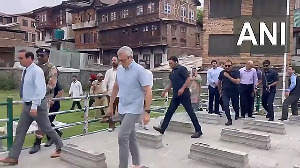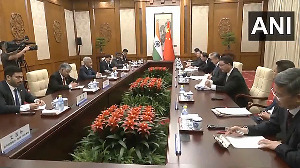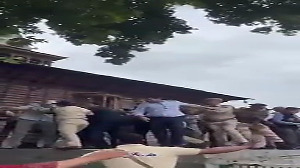President Obama had no intention of risking a global conflagration on account of the use of chemical weapons in Syria, especially at a time when he was struggling to wind up the wars his predecessor had started, says T P Sreenivasan
 In the last three weeks, the world came close to another conflict in the Middle East several times, when the United States indicated in no uncertain terms that a limited strike on Syria was inevitable.
In the last three weeks, the world came close to another conflict in the Middle East several times, when the United States indicated in no uncertain terms that a limited strike on Syria was inevitable.
“Obama simply cannot afford to pull back now. He is merely playing for time to prepare for war,” said many commentators. But right through the crisis, perceptive analysts could see that President Obama had no intention to launch a full-scale war. Having issued stern warnings about a limited strike, the US gave the impression that it was open to a face-saving device to avoid a conflict.
The reasons for coming to such a conclusion were simple. If the US were to intervene to prevent killings and to bring about a regime change, it should have done so long ago, when President Bashar al-Assad was weaker and the opposition in Syria was united and strong.
After the experiences of Egypt and Libya, the US had no guarantee that a new dispensation in Syria would serve the US national interests any better. The public opinion in the US was against starting another war in a distant land, causing loss of lives and money. The economic situation was hardly conducive to launching a war.
Russia and China had made it clear that no Security Council authorisation would be available for use of force. President Obama, the winner of the Nobel Prize for Peace, would not jeopardise his legacy by starting a war, when he was struggling to wind up the wars that his predecessor had started.
Contrary to the impression that Secretary of State Kerry was supposed to have conveyed, the US president’s power for war is not unlimited. The Power of War states: 'The constitutional powers of the president as commander in chief to introduce United States armed forces into hostilities, or in situations where imminent involvement in hostilities is clearly indicated by the circumstances, are exercised only pursuant to 1), a declaration of war, 2) specific statutory authorisation, or 3) a national emergency created by attack upon the United States, its territories or possessions, or its armed forces.'
As Brahma Chellaney has noted, the doctrine formulated by Former Secretary of State, John Powell, stipulates that “the US should use military force only when a vital national security interest is at stake; the strategic objective is clear and attainable; the benefits are likely to outweigh the costs; adverse consequences can be limited; broad international and domestic support has been obtained; and a plausible exit strategy is in place.”
But those who believed in the inevitability of war had weighty arguments. The statements from the US leadership, including President Obama and Secretary of State Kerry were the strongest evidence they produced. They did not notice that Defence Secretary Chuck Hagel was not to be seen or heard. The basic presumption, of course, was that the American “Cowboys” would begin a thoughtless war any day. The military industrial complex would push them to war to maintain themselves. The movement of US vessels matched the threatening words from the leadership, though the protests by Congressmen and Senators across party lines were loud and firm.
The suspected use of chemical weapons by the Assad regime was indeed an important issue for the US for fear that the chemical weapons would break the back of the dissident movement in Syria. It had come in the way of the American strategy to protect its interests in Syria without direct intervention. But risking a global conflagration on account of the use of chemical weapons was not on the cards for the US president. In the circumstances, the escape route provided by the Russians came as a boon.
Russia had sensed from the beginning that the US, the UK and France did not have the support for launching an attack and that was what prompted the initiation of the Russia-US deal on Syrian chemical weapons, negotiated in Geneva. The operation of the deal is contingent on Syria abiding by the provisions of the deal by declaring its chemical weapons assets and having them destroyed under international supervision on the strength of a Security Council resolution. If it does not work, the US will still have the option to take action, perhaps with the authority of the Security Council. In other words, the US had nothing to lose by the deal.
The sudden breaking out of peace has disappointed those who had expected a war. They see it in cold war terms, portraying it as a defeat of imperialism and victory of Russia. In actual fact, it shows that the world is not uni-polar any more. Not only Russia, but also the other poles in an emerging multi-polar world have begun to assert themselves. Needless to say, Russia played its cards well, even by appealing to US public opinion over the heads of its leaders.
In an unusual op-ed in the New York Times, Putin made the case for peace, without revealing the true Russian strategy. He stressed that force had proved ineffective and futile in recent years. “If we can avoid force in Syria,” he said, “this will improve the atmosphere in international affairs and strengthen mutual trust. It will be our shared success and open the door to cooperation on other critical issues.”
But to give no credit to Obama for averting a war and to consider him soft is to underestimate him. The US prestige in the Middle East has not been affected and Israel’s interests have not been sacrificed. Israel considers the presence of chemical weapons serious enough to maintain its own nuclear capability. If the Syrian deal works, it may well open up possibilities for the elimination of chemical weapons from the Arab world. All options are open even after the chemical weapons deal.
By opting for peace, President Obama has sent a message that should not be missed. He is capable of thinking out of the box, including ruling out use of force as a means of resolving issues. The message to Iran is also clear in this context as the Syrian deal is very similar to the proposal made earlier for Iranian enriched uranium to be shipped out for safe custody. If the Syrian deal succeeds, it may well be a model for dealing with the menace of fissionable material in Iran’s custody. War may not be the option and Russia may again be an ideal interlocutor to resolve the Iran nuclear imbroglio.
Even when he has three more years in the White House, President Obama has some ideas about the legacy he should bequeath to the world. A part of it has to be his championship of the African American cause, as was evident in his remarks about the remaining vestiges of racism in the United States. He may also have the desire to be known as a man of peace, having won the Nobel Prize for Peace long before he deserved it.
India should be particularly gratified that a devastating war in the Middle East has been averted, at least temporarily. The spiralling effect of an attack on Syria would have affected our vital interests in the region. The G-20 meeting provided an excellent opportunity for Dr Manmohan Singh to play a role in stressing the futility of war.
Instead of lamenting the unfulfilment of the prediction of doom, India should heave a sigh of relief at the turn of events.
Image: US President Barack Obama speaks at the 113th VFW National Convention in Reno ' Photograph: Larry Downing/Reuters
T P Sreenivasan (IFS 1967) is former Ambassador of India and governor for India of the IAEA. He is Executive Vice-Chairman, Kerala State Higher Education Council, and Director General, Kerala International Centre.
You can read more of T P Sreenivasan's columns here.











